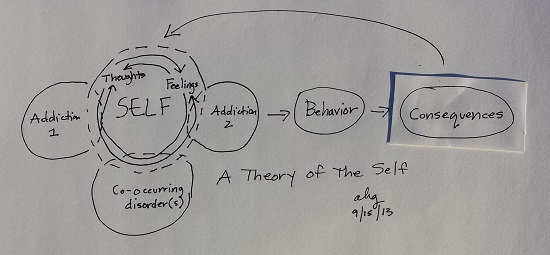I may only see a person in addictions treatment one time, ever, perhaps for no more than a 50-minute session.
The person will likely have more than one addiction, at least one accompanying mental illness, or “co-occurring disorder,” and a changed brain. He or she will have patterns of behavior, or bursts of behavior, that have resulted in harm to himself or herself and to others.
Within that 50-minute session, I will primarily be listening and may have only 5 to 10 minutes to speak. On what philosophy will my listening and speaking be based? In my 5-10 minutes, what will I say?
What will not be my philosophy is that the person with me is bad. I will be thinking of the person’s self.
Even if the self is ultimately determined to be neurochemicals, the experience of the self is what I believe each of us can influence. In 12-step recovery, one is expected to introduce oneself as an alcoholic or addict, but “I am my self and I am addicted to __________,” more closely resembles my conception of the relationship between the self and addiction.
I currently experience my self as a central, elemental essence, whole, clear, intact. On the edges of the self lie complexity. Thoughts and feelings occur there-ish and influence each other. In the diagram I’ve drawn, “A Theory of the Self,” the lines, literally, blur in relation to the self, addictions, and co-occurring disorders.
As an addictions counselor, I reach towards the person’s self. Addictions and mental illnesses may have encroached upon or melded with portions of the self, but my experience has proven this to be a meaningful working theory: the self still exists and has the power to restore and transform.
In my 5-10 minutes to speak, what would I say?
Sometimes people aren’t available to hear what’s said and it’s unkind, even cruel, to push a counselor’s views upon them, regardless of perceived helpfulness. So, I would only speak if these conditions were met: a) a counselor’s input would be therapeutic, and 2) the person might be available to hear – with no obligation to listen or to act.
If the session were held today, I would say something along these lines, semi-blurred as my insights continue to grow:
I understand you’ve had a hard time and caused others a hard time. I hear that your self feels battered and diminished. But I see your self! It’s still there! And I believe your awareness of your self can grow strong enough to make changes in your life. As you increase how conscious you are of your feelings and thoughts, you give yourself the power to choose what you feel, think or do next.
Not deathless prose, probably not worthy of a block quote. But brain studies using functional magnetic resonance imaging, fMRI, show that our thoughts can change our brains. The very brain injuries caused by addiction and mental illness brought on by trauma and/or sustained by distorted thoughts have the potential to be repaired by one’s own personal efforts in counseling.
By the self itself.
If you only had a few minutes to share the best of what you know, what would you say? Please feel free to share in the comments!


